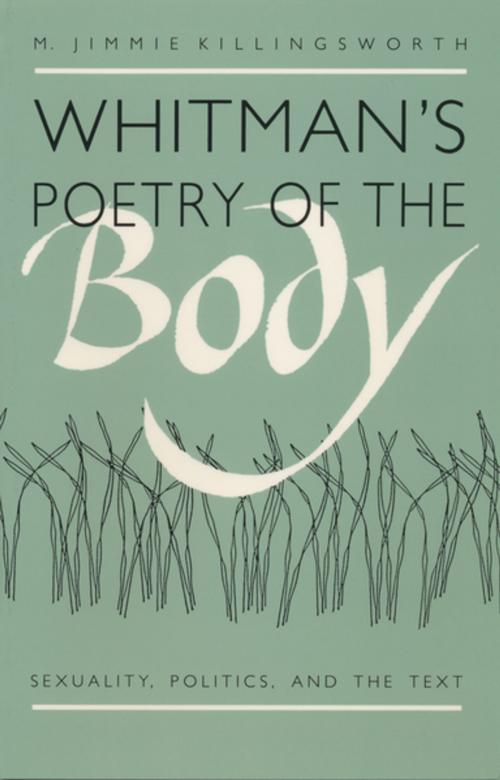Whitman's Poetry of the Body
Sexuality, Politics, and the Text
Fiction & Literature, Literary Theory & Criticism, Poetry History & Criticism| Author: | M. Jimmie Killingsworth | ISBN: | 9781469620633 |
| Publisher: | The University of North Carolina Press | Publication: | August 1, 2016 |
| Imprint: | The University of North Carolina Press | Language: | English |
| Author: | M. Jimmie Killingsworth |
| ISBN: | 9781469620633 |
| Publisher: | The University of North Carolina Press |
| Publication: | August 1, 2016 |
| Imprint: | The University of North Carolina Press |
| Language: | English |
This book combines literary and historical analysis in a study of sexuality in Walt Whitman's work. Informed by his "new historicist" understanding of the construction of literary texts, Jimmie Killingsworth examines the progression of Whitman's poetry and prose by considering the textual history of Leaves of Grass and other works.
Killingsworth demonstrates that Whitman's "poetry of the body" derives its radical power from the transformation of conventional attitudes toward sexuality, traditional poetics, and conservative politics. The sexual relation, with its promise of unity, love, equality, interpenetration, and productivity for partners, becomes a metaphor for all political and social relationships, including that of poet and reader. The effect of the poems is protopolitical, an altering of consciousness about the body's relation to other bodies, a shifting of the categories of knowledge that foretells political action.
Killingsworth traces the interplay in Whitman's poetry between sexual and textual themes that derive from Whitman's political response to the historical turbulence of mid-century America. He describes a subtle shift in Whitman's prose writings on poetics, which turn from a view of poetry in the early 1850s as morally and politically efficacious to a chastened romanticism in the postwar years that frees the poet from responsibility for the world outside his poems.
Later editions of Leaves of Grass are marked by the poet's deliberate repression of erotic themes in favor of a depoliticized aestheticism that views art not as a motivator of political and moral action but as an artifact embodying the soul of the genius.
This book combines literary and historical analysis in a study of sexuality in Walt Whitman's work. Informed by his "new historicist" understanding of the construction of literary texts, Jimmie Killingsworth examines the progression of Whitman's poetry and prose by considering the textual history of Leaves of Grass and other works.
Killingsworth demonstrates that Whitman's "poetry of the body" derives its radical power from the transformation of conventional attitudes toward sexuality, traditional poetics, and conservative politics. The sexual relation, with its promise of unity, love, equality, interpenetration, and productivity for partners, becomes a metaphor for all political and social relationships, including that of poet and reader. The effect of the poems is protopolitical, an altering of consciousness about the body's relation to other bodies, a shifting of the categories of knowledge that foretells political action.
Killingsworth traces the interplay in Whitman's poetry between sexual and textual themes that derive from Whitman's political response to the historical turbulence of mid-century America. He describes a subtle shift in Whitman's prose writings on poetics, which turn from a view of poetry in the early 1850s as morally and politically efficacious to a chastened romanticism in the postwar years that frees the poet from responsibility for the world outside his poems.
Later editions of Leaves of Grass are marked by the poet's deliberate repression of erotic themes in favor of a depoliticized aestheticism that views art not as a motivator of political and moral action but as an artifact embodying the soul of the genius.















